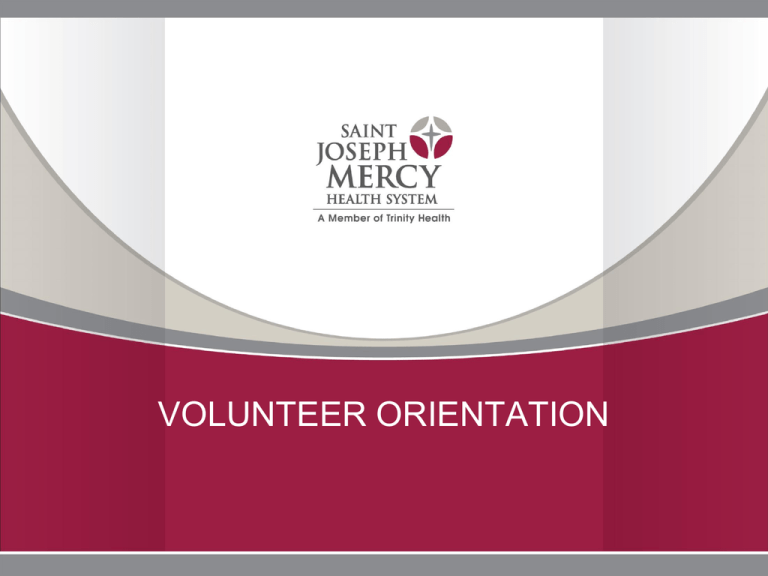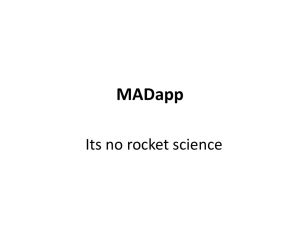Power Point - St. Joseph Mercy Ann Arbor
advertisement

VOLUNTEER ORIENTATION TABLE OF CONTENTS SAINT JOSEPH MERCY HEALTH SYSTEM DRESS CODE CUSTOMER SERVICE SMOKING POLICY INFECTION CONTROL WORKPLACE SAFETY PATIENT RIGHTS AND RESPONSIBILITY CONFIDENTIALITY HIPPA Saint Joseph Mercy Health System Saint Joseph Mercy Health System (SJMHS) is a health care organization serving six counties in southeast Michigan including n Arbor, 443-bed St. Joseph Mercy Oakland in Pontiac, 304-bed St. Mary Mercy Livonia, 164-bed St. Joseph Mercy Port Huron, 136-bed St. Joseph Mercy Livingston in Howell, and 113-bed St. Joseph Mercy Chelsea. Combined, the six hospitals are licensed for 1,697 beds, have six outpatient health centers, five urgent care facilities, more than 25 specialty centers; employ more than 14,000 individuals and have a medical staff of nearly 3,200 physicians. SJMHS has annual operating revenues of about $1.9 billion and returns $127 million to its communities annually through charity care and community benefit programs. SJMHS is a member of CHE Trinity Health Livingston, Macomb, Oakland, St. Clair, Washtenaw and Wayne. It includes 537-bed St. Joseph Mercy Ann Arbor, the second largest Catholic health care system in the country. Based in Livonia, Mich., CHE Trinity Health operates in 20 states and employs nearly 87,000 people. For more information on health services offered at Saint Joseph Mercy Health System, please visit www.stjoeshealth.org. Service Excellence Standards We appreciate each and every one of our customers and believe it is an honor to serve them. We know our customers have a choice in care and we are grateful they chose us. Diversity “Diversity is an environment wherein differences are valued and integrated into every part of an organization’s operation.” We Value Differences We recognize and value each person’s unique culture, ethnic origin and beliefs. We value and seek to understand different viewpoints. We ask the customer what name they prefer; otherwise we use titles like sir or ma’am. We treat customers and colleagues with the utmost respect regardless of their age, gender, culture, religion or their physical, social, or economic status. We respect individual and cultural preferences regarding modesty. We adapt our language and behavior to fit the age, gender, and culture of the customer. We pay attention to people’s verbal and non-verbal expressions. Mission and Guiding Behaviors Mission- We, CHE Trinity Health, serve together in the spirit of the Gospel to be a compassionate and transforming healing presence within our communities. Core Values- Reverence, Commitment to Those Who are Poor, Justice, Stewardship, and Integrity Guiding Behaviors We support each other in serving our patients and communities We communicate openly, honestly, respectfully and directly We are fully present We are all accountable We trust and assume goodness in intentions We are all continuous learners AS A MEMBER OF SJMHS TEAM… Standards of Dress and Behavior Patients and families form opinions about our standard of care partially from the appearance of those caring for patients. Dress Code Volunteers must wear a burgundy jacket at all times when volunteering. On your first day, stop by Guest Services to pick up your jacket. You are required to wear a SJMH identification badge. After completing a background check and health screening you will need to obtain your badge from Security. The badge must be worn at shoulder level and not be defaced in any way with stickers/pins attached. On your last day you must return your jacket and ID badge to the volunteer office. Dress code Do’s Wear your name badge and volunteer jacket at all times Wear closed toed shoes with hosiery Be conservative in hair, dress and make up, with long hair tied back Use fragrance-free personal products Don’ts No Blue Jeans, capri pants, leggings, sweatpants or shorts No sleeveless or midriff baring tops or jogging suits No sandals of any type, no bare legs No excessive jewelry No visible body piercings other than earrings No head covering except for religious or medical reasons No gum chewing No bare legs Policies and Procedures Computer Usage SJMHS computers are to be used exclusively for hospital business such as swiping in/out to record volunteer hours. They are not to be used to check outside email, to “surf” the net or for any personal use. No homework while on duty. Misuse can be grounds for termination. Cellular Phone/ Technology Usage Cell phones and other devices such as IPads, laptops should remain off while on duty in the hospital. Smoking Policy Saint Joseph Mercy Health System (SJMHS) prohibits the use of tobacco in any form, nontobacco smoking products, and artificial or electronic cigarettes on SJMHS-owned and leased property, including but not limited to, grounds, parking lots, vehicles in parking lots and within any SJMHS-owned or leased building or vehicle regardless of location. This policy applies to all persons, including but not limited to, patients, visitors, physicians and physician office staff, SJMHS associates and volunteers, contractors and temporary agency employees when on/in any location covered by this policy. Patients-Domestic Violence (Intimate Partner Violence IPV) Given the magnitude of the problem of domestic violence in our society, Saint Joseph Mercy Health System (SJMHS) recognizes the need for early detection and acknowledges its role in providing access to the appropriate legal and social services in addition to delivering timely medical care. The purpose of this policy is to delineate the identification, intervention and referrals for victims of domestic violence. Definitions We define domestic violence as a pattern of abusive behavior in any relationship that is used by one partner to gain or maintain power and control over another intimate partner. Domestic violence can be physical, sexual, emotional, economic, or psychological actions or threats of actions that influence another person. This includes any behaviors that intimidate, manipulate, humiliate, isolate, frighten, terrorize, coerce, threaten, blame, hurt, injure, or wound someone. Policy If a volunteer learns of a situation that may indicate that a patient is a current victim of domestic violence, bring the information directly to the healthcare provider responsible for the patient. It will be their responsibility to further assess and refer according to our policy. Infection Control Hand washing is the single most effective way to prevent the spread of infection Hands must be washed: On arrival to work Before leaving the restroom Before and after eating Before serving food After removing gloves Between handling of patients After using the toilet, after blowing or wiping the nose Before leaving the hospital. Avoiding contact with blood and other body fluids of patients is a standard precaution. When HCAI, multi-drug resistant organisms are suspected, the best prevention would be hand washing and wearing gloves. Hand Hygiene Moisten hands well with running water. Apply soap to wet hands. Work up a lather using friction; be sure to get between the fingers and around the nails. Rub all surfaces for at least 15-30 seconds. Rinse with the running water flowing off the hands. Avoid touching the inner surface of the sink. Dry hands thoroughly with a paper towel; turn faucet off with a paper towel and discard the towel in the wastebasket. Wheelchair Transportation You will receive specific wheelchair training from your unit Here are some key reminders Always introduce yourself and be friendly, cooperative and cheerful. When assisting a patient in or out of a wheelchair be sure to set the brakes. See that the patient's arms are inside the armrests, not hanging over the side. Before transporting a patient make sure they are fully covered. Ask the patient if s/he is ready before moving and explain where you are going. Tobacco-Free Environment SJMHS is committed to modeling a place of wellness and prevention, as well as treatment, for our patients, visitors, associates and volunteers. Smoking and tobacco use is prohibited anywhere on the hospital grounds including parked vehicles. Volunteer Guidelines Site Liaison- Your main contact person for the unit you are assigned to. The person in charge of you who will be responsible for your orientation and training. Although you may report weekly to other staff. Please inform your liaison when you will be out of town, when you are sick, or when your discontinuing volunteering. Volunteer Guidelines You are required to swipe in and out on the day you work. This is necessary for you to be covered by our liability insurance, to record your volunteer hours, and lastly your service awards. Volunteer kiosks are located in the following locations: SJMH Front Desk, RHB Staff lounge, Family Birth Center / Imaging Center hallway, Women’s Health Center 2nd floor Information Desk. Volunteers working in other off site locations sign in where they work. Sign-in logs will be faxed on a monthly basis to (734)712-7178. When you come to volunteer and your sheet is gone, you will need to start a new one. Illness, Attendance, & Accidents Illness If you are not feeling well, you should stay home and contact your liaison to let them know you will not be in on the day Attendance Be punctual and regular in attendance but if you are unable to make a shift you should let your liaison know ahead of time. Accident on Duty If you witness an accident or are injured yourself report to your department liaison immediately. Workplace Safety Back safety (Correct Body Mechanics) Survey the work area prior to moving an object. Test the load before lifting or carrying. Make sure the load can be moved safely, otherwise ask for help. When lifting an object, place one foot in front of the other. This provides a solid base of support. Keep objects to be lifted or carried close to the body. Squat close to objects being lifted to use the large muscles of the legs to assist in lifting. Push objects instead of pulling. If you feel like the object is too heavy ask for help. Right-To-Know Volunteers have the “Right-to-Know” the identities and hazards of substances they work with. MSDS Material Safety Data Sheets give detailed information regarding products. Ask your site liaison if you need to see one. MSDS topics you need to be aware of are the health hazards and the protective measures. Product labels give a quick overview of hazards associated with the product. If you come across a chemical spill call the emergency number 911, for cleanup. Fire Safety Tips to remember so you do not place individuals at risk in emergency situations Keep exit ways and corridors free of storage items and obstructions. Do not block fire pulls and fire extinguishers. Do not prop open automatic fire doors. When placing items in storage closets you need to keep items a minimum of 18 inches away from the ceiling. Emergency Codes Code Red – Fire or smoke has been detected Code White – Security assistance needed for a potentially threatening or dangerous situation Code Orange – A bomb threat has been called into the hospital Code Blue – Cardiac/Respiratory arrest Code Pink- Infant/child abduction or is missing Emergency codes Code Grey – Tornado watch Code Black – Tornado warning, funnel cloud has been sighted Code Green – Medical emergency, a person is alert but unable to get up. Code Yellow – Internal or external disaster, an event affecting operations and or resulting in casualties. Code Teal- Patient Elopement (Patient attempts to leave the hospital without authorization) Volunteers should report to their site liaisons for specific instructions for all emergency procedures. Interacting with Patients Introduce yourself Call them by title and last name, unless they ask to be called by another name Do not address them with names such as honey, sweetie, dear, etc. Explain procedures and allow time for questions Be respectful Customer Service We are all in the customer service business. We must continually strive to meet the needs and demands of our patients, families, employees and visitors in a caring and quality-driven manner. AIDET Acknowledge Introduce Duration Explanation Thank You Handling Customer Complaints A 4 Approach Acknowledge the situation: "I can see how this has been a difficult situation for Mr. Smith." Apologize for the situation: "I am so sorry that you have not had a good experience." Ask: "How can we make this situation better for you?" Act: "This is what I will/can do. Are you comfortable with this?" Then set follow-up expectations. We always assume a solution can be reached. We are all empowered to address complaints. If we cannot solve a problem, we engage the appropriate individual(s) to assist the customer. We offer personal help and take action even if rules, regulations or policies seem to stand in the way. We never make excuses or place blame when handling complaints. We listen attentively when speaking with an upset customer. We lower our voice, make eye contact and use extreme courtesy. Patient Rights The values of SJMHS support the need to foster the dignity and preserve the right of each patient. Our Primary Concern in Patient Care is to Value and Respect the Dignity of all Patients. Platinum Rule We treat others NOT how we think they should be treated BUT how they want to be treated. Confidentiality Treat all personal information that patients tell you as confidential. Verbal discussions relating to specific patients, patient care and or location must be held in a manner that protects the patient’s confidentiality. Never read a patient's medical chart. Do not ask about the diagnosis or facts of a case. Ex: If you saw a neighbor at the hospital, you cannot tell anyone you know them HIPPA Privacy Rule Federal Protection Of Privacy Rights Protects Patient’s Heath Information, Both Paper and Electronic. Preserve Quality Healthcare. Organizational Integrity SJMHS and each of us individually are held accountable for our behaviors and actions. Your Liaison – This is usually the best place to start in getting answers to your questions Volunteer Manager – If you are not comfortable asking your liaison or volunteer manager Your Local Integrity Officer – Your Local Integrity Officer is a member of senior management responsible for the operation of the Organizational Integrity Program in your organization.1-866-477-4661 or you may file a report online at www.mycompliancereport.com. Termination of your services Return your badge to Guest Services Return your jacket to Guest Services Inform your liaison that you will not be volunteering anymore Inform Volunteer Services you will not be volunteering anymore We are pleased that you have decided to volunteer at SJMHS. We appreciate your commitment and hope your work will be meaningful and enjoyable. WELCOME TO THE TEAM!




